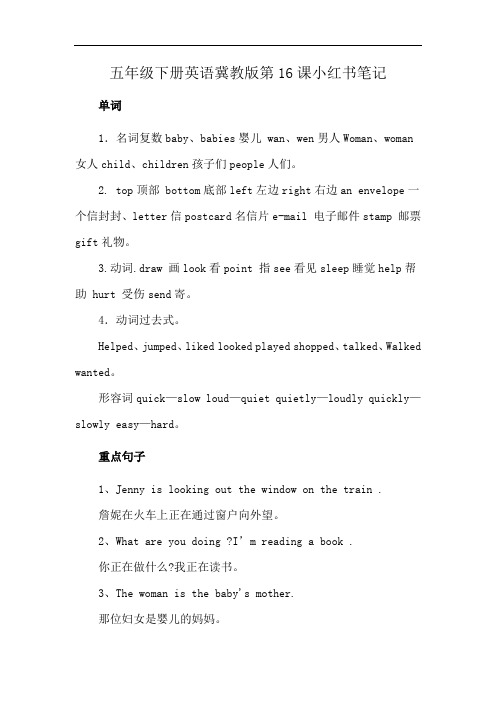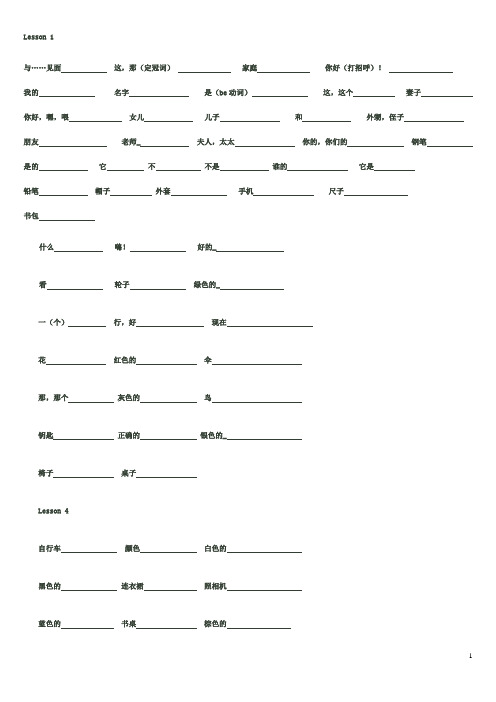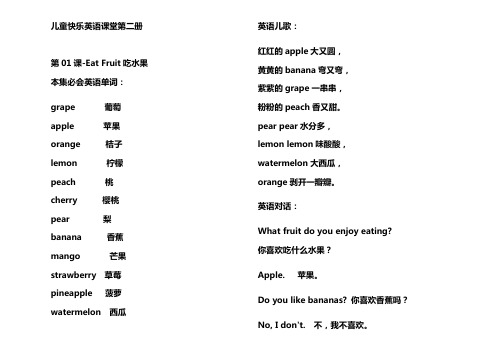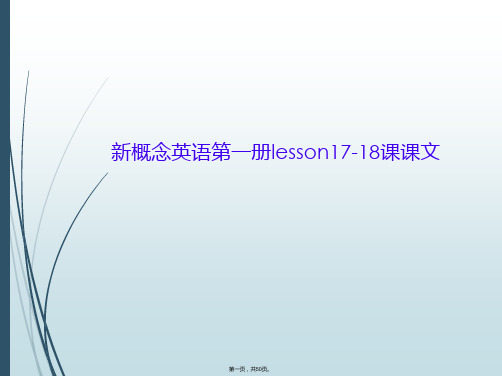15-16课BONNY
五年级下册英语冀教版第16课小红书笔记

五年级下册英语冀教版第16课小红书笔记单词1.名词复数baby、babies婴儿 wan、wen男人Woman、woman女人child、children孩子们people人们。
2. top顶部 bottom底部left左边right右边an envelope一个信封封、letter信postcard名信片e-mail 电子邮件stamp 邮票gift礼物。
3.动词.draw 画look看point 指see看见sleep睡觉help帮助 hurt 受伤send寄。
4.动词过去式。
Helped、jumped、liked looked played shopped、talked、Walked wanted。
形容词quick—slow loud—quiet quietly—loudly quickly—slowly easy—hard。
重点句子1、Jenny is looking out the window on the train .詹妮在火车上正在通过窗户向外望。
2、What are you doing ?I’m reading a book .你正在做什么?我正在读书。
3、The woman is the baby's mother.那位妇女是婴儿的妈妈。
4、The woman is sitting behind Jenny on the train .在火车上那位妇女坐在詹妮后面。
5、Would you like a cup of tea?你想要杯茶吗?6、May I have some soup ?Please,sure.我可以喝些汤吗?当然了。
7、They are laughing loudly .他们正在大声地笑。
8、How old is the Palace Museum .It's about five hundred years old .故宫博物馆有多少年的历史了?大约五百年了。
新概念课堂笔记第一册Lesson15-16

新概念课堂笔记第一册Lesson15-16 Word Studygirl【用法】n. 女孩,小姐【扩展】girlfriend 女朋友boyfriend 男朋友friend【用法】n. 朋友【词组】make friends with…和…交朋友【扩展】friendly adj. 友好的friendship n. 友谊brown【用法】adj. 棕色的,咖啡色的【词组】brown paper 牛皮纸brown sugar 红糖these【用法】pron. 这些【词组】these days 这段生活【扩展】this 那个—these 这些that 那个—those 那些black【用法】adj. 黑色的【扩展】blackboard n. 黑板Numbers102—a hundred and two110—a hundred and tenText ExplanationYour passports, please. Here they are.【译文】请出示你们的护照。
给您。
【用法】Your passport, please.是简略说法,完整形式为:Show me y our passport, please.Here they are. “给您”因为此处passports为复数,因此用了they are。
假如是单数的话,能够说Here it is. 也能够说成Here you are. 以上三种表达差不多上“给您”的意思。
Our cases are brown. Here they are.【译文】我们的箱子是棕色的。
它们在这儿呢。
【用法】本句中的Here they are. 是表示“他们在那个地点”,they 指代our cases。
这是一个倒装句,完整的说法为:Our cases are here.That’s fine.【译文】好了。
【用法】在口语中,That’s fine.和This is fine. 专门常用,能够翻译为“能够了”、“完成了”、“做的不错”、“专门顺利”等。
JNCE2B新概念青少 2B _Unit16

19
Karen: Then I _lo_o_k_e_d_f_o_rmy car keys. I
looked in my bag, in my coat, in the kitchen,
_ev_e_r_y_w_h_e_r_e.
William: And where实用w精品e课r件ePPTthey?
20
实用精品课件PPT
8
What did she unlock the house with?
She unlocked the house with my house keys.
实用精品课件PPT
9
What did they talked about? They talked about the weekend.
Karen: It’s OK. I’m being _s_ill_y_. .
William: That’s i_m_p_o_s_s_ib_l_e. You’re never silly.
Karen: Oh, but I am! I’m silly _a_ll_t_h_e_t_im_e__.
Believe me!
Unit 16
What’s your middle name?
实用精品课件PPT
1
Describe
实用精品课件PPT
2
Match the correct picture
1
2
3
4
5
6
TfmlcdTIhImsOtoWiiohnmioudhhshoidgaoinueecde,kredtplsnnnueb.o…oirdiedyeaefdIlimimlknrnsitmvpatyheag.yhieeilwmstic!adboen!whbkmInho实,wgf’eaheamos用eu‘enSgdvod精srrtf!品.ee,usiotmtoul课h.mhlrisri件lnpyneyleePSyyePsmscTwwcuasiioalnanyelslimlytrld’ehlmlt.kiihteaktshemtyeyelieym.snysdy.,I
新概念英语第一册第15,16,17,18课

Lesson 15 Your passports, please.请出示你们的护照。
Listen to the tape then answer this question. Is there a problem with the Customs officer?听录音,然后回答问题。
海关官员有什么疑问吗?CUSTOMS OFFICER: Are you Swedish?海关官员:你们是瑞典人吗?GIRLS: No, we are not.We are Danish.姑娘们:不,我们不是瑞典人。
我们是丹麦人。
CUSTOMS OFFICER: Are your friends Danish, too?海关官员:你们的朋友也是丹麦人吗?GIRLS: No, they aren't.They are Norwegian.姑娘们:不,他们不是丹麦人。
他们是挪威人。
CUSTOMS OFFICER: Your passports, please.海关官员:请出示们的护照。
GIRLS: Here they are.姑娘们:给您。
CUSTOMS OFFICER: Are these your cases?海关官员:这些是你们的箱子吗?GIRLS: No, they aren't.姑娘们:不,不是。
GIRLS: Our cases are brown.Here they are.姑娘们:我们的箱子是棕色的。
在这儿呢。
CUSTOMS OFFICER: Are you tourists?海关官员:你们是来旅游的吗?GIRLS: Yes, we are.姑娘们:是的,我们是来旅游的。
CUSTOMS OFFICER: Are your friends tourists too?海关官员:你们的朋友也是来旅游的吗?GIRLS: Yes, they are.姑娘们:是的,他们也是。
CUSTOMS OFFICER: That's fine.海关官员:好了。
(2021年整理)青少版新概念2B课文文本Unit16-30

青少版新概念2B课文文本Unit16-30编辑整理:尊敬的读者朋友们:这里是精品文档编辑中心,本文档内容是由我和我的同事精心编辑整理后发布的,发布之前我们对文中内容进行仔细校对,但是难免会有疏漏的地方,但是任然希望(青少版新概念2B课文文本Unit16-30)的内容能够给您的工作和学习带来便利。
同时也真诚的希望收到您的建议和反馈,这将是我们进步的源泉,前进的动力。
本文可编辑可修改,如果觉得对您有帮助请收藏以便随时查阅,最后祝您生活愉快业绩进步,以下为青少版新概念2B课文文本Unit16-30的全部内容。
青少版新概念2B课文文本Unit 16—30Unit 16:What’s your middle name?WILLIAM: Is there something wrong Karen?KAREN: It's OK。
I'm being silly。
WILLIAM: That's impossible .You're never silly。
KAREN: Oh, but I am! I'm silly all the time。
Believe me!KAREN: I did something very silly this morning。
I picked up some shopping in town.KAREN: I arrived home at about 10 o'clock, and parked the car in the drive.I unlocked the house with my house keys.KAREN: Then, Daisy called me on my mobile, and we talked about the weekend。
We discussed plans for Sunday. Then we finished the call.KAREN: Then I looked for my car keys。
新概念英语青少版第二册第15课The weighing machine

新概念英语青少版第二册第15课The weighing
machine
Revision Lesson 15 The weighing machine
复习课15 磅秤
Narrator: Sandy and Sue are coming home from school.
桑迪和苏正从学校回家
They meet Professor Boffin.
他们遇见了伯菲教授
Narrator: Professor Boffin is taking his coat off.
伯菲教授正在脱大衣
Sandy: What are you going to do,Professor Boffin?
伯菲教授,您干什么呀
Professor: I'm going to weigh myself,Sandy.
桑迪,我想称称体重
Sue: Where?
在哪里称
Professor: I'm going to weigh myself on this weighing machine.
就在这个磅秤上称
Professor: I'm going to put a penny in the slot.
我要把一便士塞进那个口子
There! (Sandy and Sue laugh.)
进去了 (桑迪和苏笑了起来)
Professor: What's the matter,children?
孩子们,怎么了?
Sue: You're still holding your coat,Professor Boffin! 伯菲教授,您还拿着大衣呢!。
新概念英语青少版2B unit16精PPT课件

精选课件PPT
14
动词过去式变化,还记得吗? 一起复习吧!
1.一般在动词尾加ed
helped looked watched
2.以不发音e结尾只加d
arrived used loved lived moved
3.辅音字母+y结尾时,y变i,加ed
studied cried try-tried copy-copied
2. You never help/helped Annie.
3. We really enjoy/enjoyed our holidays.
4. They like/liked eating at the Chinese restaurant.
5. On Monday,we pick/picked up the shopping.
精选课件PPT
11
• 3) How can I get to the post office? 我怎样才能到达邮局。(get必须和to 连用才有到达之意)
• 4) They reached the top of the mountains. 他们到达了山顶。
精选课件PPT
12
Karen : Then I looked for my car keys.
I looked in my bag, in my coat,
in the kitchen, everywhere.
William: And where were they?
after
around
look 短语总结 look
at for
like
精选课件PPT
13
Karen: They were in my hand! The key-ring was on my little finger. William, ‘Silliness’ is my middle name!
新概念英语青少版1A unit1-unit10单词

Lesson 1与……见面这,那(定冠词)家庭你好(打招呼)!我的名字是(be动词)这,这个妻子你好,嘿,喂女儿儿子和外甥,侄子朋友老师_ 夫人,太太你的,你们的钢笔是的它不不是谁的它是铅笔帽子外套手机尺子书包什么嗨!好的_看轮子绿色的_一(个)行,好现在花红色的伞那,那个灰色的鸟钥匙正确的银色的_椅子桌子Lesson 4自行车颜色白色的黑色的连衣裙照相机蓝色的书桌棕色的一(个)(用在元音开头的单词前代替冠词a)Lesson 5谁男孩哪一个在……上面男人有,带着先生他父亲她女人母亲女孩姐妹看(短语)年轻的在……里面陈旧的小汽车噢!堂兄弟(姐妹)那么也兄弟他们的学生他的她的新的Lesson 6马告诉我关于……黄色的出租车Lesson 7健康的怎么样? 我你好吗?(短语) 健康的,舒适的但是非常抱歉的,遗憾确信的,肯定的热的饥饿的口渴的可怜的……呢?医生忙碌的生病的或许,可能有备无患!冷的是(用于复数)Lesson 8或者聪明的伤心的愚蠢的(两种表达)高兴的故事有趣的Lesson 9邻居美好的在来你是做什么工作的?体育学院艺术学院姨妈,姑妈作家我们的丈夫每个人谢谢你!为了,因为欢迎Lesson 10她(宾格)工作家庭主妇摄影师警察邮递员男演员会计Lesson 11闲谈_______ 在那边______高的_____ __ 漂亮的_____ __ 哪里?____ 来自____ ___ 英国的______ _ 美国的____ 华盛顿____ ___ 这里____ ___ 著名的____ __ 昂贵的_____ __美丽的____ ___ 英俊的___ 等待____ ___ 看见____ __ 伦敦_____ _国籍____ ___Lesson 12描述_ ___ __ 矮的_____ __ 中国的__ ___ 法国的____ ___ 胖的____ _ 瘦的_______ 女演员______Lesson 13妈妈(两种表达)______ 爸爸__ _____(同类中的)一样东西_____ __ 最喜欢的___ __ __长的_______ 书包____ __ _ 给_______我(宾格)______ 请____ ___ 放,摆_______给你。
新青少版新概念2B-Unit16课件

新青少版新概念2B-Unit16课件
l nap [plæ n] n.计划
对于……的计划 the plan for … 新青少版新概念2B-Unit16课件
你们打算做什么明天?
What are you going to do tomo我rr们ow打?算讨论周日的计划。
We’re going to discuss the plan for Sunday.
Unit 16
What’s your middle name? 你的中名是什么?
新青少版新概念2B-Unit16课件
英文名字书写 1.英美国家名字书写:姓在前,名在后
William Jefferson Clinton
middle name
first name
last name
(很多场合中间名往往略去不写 )
Robert Thomas Pattinson
罗伯特·托马斯·帕丁森 新青少版新概念2B-Unit16课件
New Words and Expressions
middle name wrong impossible all the time park drive unlock discuss
['midl. neim]
新青少版新概念2B-Unit16课件
everywhere 各处,到处
1.The snow had drifted everywhere. 雪飘至各处。
2.She blazed her discovery abroad everywhere.
她到处宣扬她的发现。
新青少版新概念2B-Unit16课件
everywhere还可作连词ቤተ መጻሕፍቲ ባይዱ 意思是“无论哪里”
儿童快乐英语课堂第二册

儿童快乐英语课堂第二册第01课-Eat Fruit吃水果本集必会英语单词:grape 葡萄apple 苹果orange 桔子lemon 柠檬peach 桃cherry 樱桃pear 梨banana 香蕉mango 芒果strawberry 草莓pineapple 菠萝watermelon 西瓜英语儿歌:红红的apple大又圆,黄黄的banana弯又弯,紫紫的grape一串串,粉粉的peach香又甜。
pear pear水分多,lemon lemon味酸酸,watermelon大西瓜,orange剥开一瓣瓣。
英语对话:What fruit do you enjoy eating?你喜欢吃什么水果?Apple. 苹果。
Do you like bananas? 你喜欢香蕉吗?第02课-My Body我的身体本集必会英语单词:head 头neck 脖子shoulder 肩膀arm 胳膊hand 手waist 腰leg 腿foot 脚skin 皮肤finger 手指knee 膝盖toe 脚趾英语儿歌记单词:head头脑反应快,neck脖子真灵活。
shoulder肩膀挑重担;hand双手把活干。
leg, foot腿和脚,用它走路用它跑。
伸伸arm做体操,waist摇摇我的腰。
快速反应:大家一起做早操,天天锻炼身体好。
Touch your head, 摸摸你的头。
Move your legs,动动你的腿。
Clap your hands, 拍拍你的手。
Tap your feet on the floor, 跺跺你的脚。
第03课-My mood我的情绪本集必会英语单词:happy 高兴smile 笑sad 悲伤cry 哭angry 生气surprise 吃惊afraid 害怕本课少儿英语口语句子:A: Are you sad?你不开心吗?B: I'm very angry.我很生气。
A:Don't cry.别哭情绪单词英语儿歌:happy happy真高兴,smile smile挂笑容。
新概念英语第一册lesson17-18课课文

man 男人 men/men/<pl.>
Lesson 17 How do you do?
第七页,共50页。
office
办公室
Lesson 17 How do you do?
第八页,共50页。
assisant 助手
Lesson 17 How do you do?
第九页,共50页。
第二十八页,共50页。
sales rep
第二十九页,共50页。
Keyboard operator
第三十页,共50页。
mechanic
第三十一页,共50页。
hairdresser
第三十二页,共50页。
teacher
第三十三页,共50页。
Customs officer 第三十四页,共50页。
❖ 以f或fe 结尾的,变v再加es
❖ housewife——housewives
❖ knife——knives ❖ Wolf——wolves
Lesson 17 How do you do?
第二十五页,共50页。
Grammar
❖ 名词变复数不规则情况
❖ man-men ❖ milkman-milkmen ❖ policewoman-policewomen
Lesson 17 How do you do?
第三页,共50页。
employee 雇员
Lesson 17 How do you do?
第四页,共50页。
hard-working 勤奋的
Lesson 17 How do you do?
第五页,共50页。
sales reps
推销员
Lesson 17 How do you do?
新概念英语第一册课文word版03090

Lesson1: Excuse me!Excuse me!Yes?Is this your handbag?Pardon?Is this your handbag?Yes, it is.Thank you very much。
Lesson 3:Sorry sir。
My coat and my umbrella please。
Here is my ticket。
Thank you sir.Number five.Here is your umbrella and your coat。
This is not my umbrella。
Sorry sir。
Is this your umbrella?No, it isn’t。
Is this it?Yes,it is.Thank you very much.Lesson 5: Nice to meet you.Good morning.Good morning, Mr。
Blake。
This is Miss Sophie Dupont。
Sophie is a new student。
She is a French。
Sophie, this is Hans.He is German.Nice to meet you.And this is Naoko。
She’s Japanese。
Nice to meet you。
And this is Chang-woo.He's Korean. (朝鲜人)Nice to meet you.And this is Luming。
He’s Chinese.Nice to meet you。
And this is Xiaohui.She’s Chinese, too。
Nice to meet you.Lesson 7:Are you a teacher?I’m a new student。
My name's Robert.Nice to meet you.My name's Sophie.Are you French?Yes, I’m.Are you French,too?No, I'm not。
新概念英语第一册1-65课单词带注解

新概念英语第一册1-65课单词带注解1excuse v. 原谅me pron.我(宾格)I(主格)my(物主代词) we(复数主格)us(复数宾格)mine(n性物主代词) yes adv. 是的is v. be动词现在时第三人称单数this pron. 这(对应词that)(复数these) your possessive adjective 你的,你们的handbag n.(女用)手提包pardon int. 原谅,请再说一遍I beg your pardon=Say it again.it pron. 它thank you 感谢你(们)=thanksvery much 非常地修饰V词放在句末,或V后面。
2pen n.钢笔所有笔的总称pencil n.铅笔book n.书,本,预定watch n.手表,V观看coat n.上衣,外衣,遮阳伞的涂层raincoat 雨衣dress n.连衣裙 V给...穿衣服skirt n.裙子,短裙shirt n.衬衣的总称,男衬衣(对应词:女衬衣blouse)car n.小汽车,汽车的总称house n.房子3umbrella n.伞(用an/a区别它与雨衣)please int.请,V使...高兴here adv.这里(对应:there)my possessive adjective 我的ticket n.票(+to 去某地的车票)number n.号码,数字five num.五sorry adj.对不起的+for+n :+to+v :sir n.先生cloakroom n.衣帽存放处4suit n.一套衣服,V合适school n.学校teacher n.老师,V:teachson n.儿子(同音词:sun)daughter n.女儿(与son互为对应词)5Mr. 先生(全称:mister)good adj.好(adv:well)morning n.早晨,上午Miss 小姐,错过,思念new adj.新的(对应词:old)student n.学生(V:study)(小学生:pupil) French adj.&n.法国人(n:France) German adj.&n.德国人(n:Germany) nice adj.美好的(各种好:好吃的、好玩的)meet v.遇见(同音词meat)Japanese adj.&n.日本人(n:Japan)(复数是本身)Korean adj.&n.韩国人(n:Korean)Chinese adj&n.中国人(n:China 中国,瓷器:复数是本身)too adv.也(同音词:to two)(否定句中用either)6make n.(产品)牌号,V制作,V使...怎样(首选接adj,否则用v 原形)Swedish adj.瑞典的English adj.英国的American adj.美国的Italian adj.意大利的Volvo n.沃尔沃(Swedish)Peugeot n.标致(French)Mercedes n.梅赛德斯(German)Toyota n.丰田(Japanese)Daewoo n.大宇(Korean)Mini n.迷你(English)Ford n.福特(American)Fiat n.菲亚特(Italian)7I pron. 我(同音词:eye)am v. be动词现在时的第一人称单数(不能与not合起来缩写) are v. be动词现在时复数(同音:“r”)name n. 名字what adj.& pron. 什么nationality n. 国籍nation n 国家(政治性)=country(地理性)national adj 国家的international adj 国际的job n. 工作=workkeyboard n. 电脑键盘(key:钥匙、答案、键子,board:板) operator n. 操作人员engineer n. 工程师engine n 发动机engineering n 工程8policeman n. 警察(police 警察的总称)policewoman n.女警察taxi driver n. 出租汽车司机air hostess n. 空中小姐postman n. 邮递员(post:邮递,邮政)nurse n. 护士mechanic n. 机械师(machine n 机械)hairdresser n. 理发师(=barber)housewife n. 家庭妇女milkman n. 送牛奶的人milk n 牛奶,奶牛 V 挤奶9hello int. 喂(表示问候)hi int. 喂,嗨(同音词:high)how adv. 怎样today adv. 今天,在今天(n 今天)(对应词:tonight)well adj. 身体好fine adj. 美好的(当表达身体好时=well,其它好时不等),n:罚款;adj:完美的thanks int. 谢谢goodbye int. 再见= bye=see yousee v. 见,明白(同音词:"c",sea,SEA(东南亚))10fat adj. 胖的=heavy adj:重的;n:脂肪,肥肉woman n. 女人thin adj. 瘦的,薄的(对应:thick)tall adj. 高的short adj. 矮的,短的(对应:long)shorts:短裤dirty adj. 脏的(与“干净的”互为对应词)clean adj. 干净的 V:弄干净cleaner :清洁工hot adj. 热的,辣的 n:heat 热量 V:加热cold adj. 冷的,n :感冒old adj. 老的,旧的(对应:new)young adj. 年轻的busy adj. 忙的(对应:闲的free) business n 生意lazy adj. 懒的(与“忙的”互为对应)11whose pron. 谁的(同音词: who's)blue adj. 蓝色的perhaps adv. 大概=maybewhite adj. 白色的,怀特catch v. 抓住12father n. 父亲mother n. 母亲blouse n. 女衬衫sister n. 姐,妹(与“兄,弟”互为对应)tie n. 领带(系... +to)brother n. 兄,弟his possessive adjective. 他的her possessive adjective. 她的13colour n. 颜色=color(美),V涂色,上光green adj. 绿色,格林come v. 来(对应词:go)upstairs adj. 楼上(对应词:downstairs)smart adj. 时髦的,巧妙的,聪明的hat n. 帽子=capsame adj. 相同的(接单数)(对应词different:接复数)lovely adj. 可爱的 V:love14case n. 箱子(较精致)=box(简单,一次性的)carpet n. 地毯dog n. 狗15customs n. 海关custom: n 风俗,习惯customer n 顾客officer n. 官员 office n 办公室girl n. 女孩,姑娘(与boy互为对应词)Danish adj.& n. 丹麦人friend n. 朋友(与某人交朋友用with连接),friendly adj 友好的Norwegian adj.& n. 挪威人passport n. 护照brown adj. 棕色的,布朗tourist n. 旅游者 tour V 旅行16Russian adj.&n. 俄罗斯人Dutch adj.&n. 荷兰人these pron. 这些(复数)(对应词:those)red adj. 红色的grey adj. 灰色的=grayyellow adj. 黄色的black adj.黑色的(对应词:white) orange adj. 橘黄色的17employee n. 雇员employ v 雇佣employer n 雇主hard-working adj. 勤奋的(对应词:lazy)sales reps 推销员=sales representatives man n. 男人office n. 办公室assistant n. 助手18twentythirtyfortyfiftysixtyseventyeightyninetyone/a hundredone/a thousand19matter n. 事情,麻烦事,不贬义children n. 孩子们(child 的复数)tired adj. 累,疲乏boy n. 男孩thirsty adj. 渴 thirst n 口渴;渴望Mum n. 妈妈sit down 坐下sit v 坐 seat n 座位right adj. 好,可以,合适的,右(对:left),正确的(对:wrong) (同音词:write)ice cream 冰淇淋(有时可数,有时不可数)20big adj. 大的=large:巨大的=great 抽象意义的,无实体small adj. 小的,有贬义=little(有感情色彩)open adj. 开着的shut adj. 关着的shut up 闭嘴light adj. 轻的,点燃,浅色的,明亮的,灯,光lighting n 照明heavy adj. 重的(与light对应,可用于雨、雪的量大小)long adj. 长的shoe n. 鞋子(常用复数形式)grandfather n. 祖父grandmother n. 祖母grand 宏伟的,祖孙关系,加大变大,加小变小21give v. 给one pron. 一个which 哪一个22empty adj. 空的,V倒空(与full互为对应)full adj. 满的,饱的(对应:hungry)(fill v 装满)fill... with... 用...装满...be full of 充满large adj. 大的little adj. 小的sharp adj. 尖的,锋利的(与“钝的”互为对应) blunt adj. 钝的box (boxes) n. 盒子,箱子glass (glasses) n. 杯子,玻璃,镜片glasses 眼镜cup (cups) n. 茶杯bottle (bottles) n. 瓶子tin (tins) n. 罐头knife (knives) n. 刀子fork (forks) n. 叉子spoon (spoons) n. 勺子23on prep. 在……之上shelf n. 架子,搁板 on the shelf24desk n. 课桌table n. 桌子plate n. 盘子=dish 碟,...道菜cupboard n. 食橱cigarette 可数n. 香烟television n. 电视机(TV)floor n. 地板,室内的地面,楼层=ground 室外的地面on the floordressing table n. 梳妆台magazine n. 杂志bed n. 床newspaper n. 报纸stereo n. 立体声音响25Mrs. 夫人(接丈夫的姓)(对应词Mr)kitchen n. 厨房refrigerator n. 电冰箱(缩写:fridge) right n. 右边electric adj. 带电的,可通电的electricity 不可数n 电left n. 左边cooker n. 炉子,炊具middle n. 中间in the middle ofof prep.(属于)……的room n. 房间26where adv. 在哪里(同音词:wear)in prep. 在…里living room 客厅live V 居住,生活near prep. 靠近 =beside 相对更近一些widow n. 窗户 wind n 风armchair n. 扶手椅(in)door n. 门 =gate(两边都在室外)near the doorpicture n. 图画=photowall n. 墙 on the wall28trousers n. 长裤29shut v. 关门bedroom n. 卧室untidy adj. 乱,不整齐 (对应词:dity 整齐的)must modal verb 必须,应该open v. 打开 adj 开着的air v. 使…通风,换换空气 n 空气,航空put v. 放置clothes n. 衣服cloth 不可数n 布料 clothing 衣服的总称wardrobe n. 大衣柜dust v. 掸掉灰尘土sweep v. 扫30empty v. 倒空,使…变空(对应词:full)read v. 读sharpen v. 削尖,使锋利put on 穿上(与脱掉互为对应)take off 脱掉turn on 开(电灯)(对应水、电等新现象产生的状态)=open turn off 关(电灯)garden n. 花园,菜园,果园zoo 动物园park 公园,停车under prep. 在……这下(对应 on)tree n. 树climb v. 爬,攀登who pron. 谁(宾格:whom,物主:whose)run v. 跑,经营;;runner赛跑者grass n. 草,草地after prep. 在……之后(动态下,时间,顺序的变化)=befind(静止状态下位置的变化)across prep. 横过,穿过cross V 穿过 n 十字形物体ceossing 十字路口cat n. 猫32type v. 打字,n 类型=kind(种类,友好的=friendly) typist n 打字员letter n. 信,字母basket n. 篮子eat v. 吃bone n. 骨头clean v. 清洗,adj 干净的cleaner n 清洁工tooth n. (复数 teeth)牙齿brush one's teeth 刷牙toothbrush 牙刷cook v. 做(饭菜) n 厨师cooker 炉具,厨具milk n. 牛奶 V 挤奶meal n. 饭,一顿饭(三餐无冠)drink v. 喝tap n. (水)龙头tape 磁带33day n.日子(即指全天,也指白天)cloud n.云 cloudy adj 多云的sky n. 天空 in the skysun n. 太阳(月亮等均为特指,前用the)shine v. 照耀 n 光线sunshine 阳光with prep. 和……在一起family n. 家庭(成员)walk v. 走路, 步行(+to :步行去某地=go to ... on foot)over prep.跨越,在……之上=more thanbridge n. 桥boat n. 船(in)river n. 河ship n. 轮船(on)aeroplane n. 飞机(an+...)fly v. 飞 n 苍蝇34sleep v. 睡觉sleepy adj 困的asleep adj 睡着的shave v. 刮脸cry v. 哭,喊=shoat(lauge throw +at恶意+to善意) wash v. 洗wait v. 等(+for)jump v. 跳35photograph n. 照片=picturevillage n. 村庄villager n 村民valley n. 山谷between prep. 在……之间(二者之间)=among(三者之间)twin 双胞胎之一twice 两次hill n. 小山=mountain 大山;希尔another det. 另一个wife n. 妻子(对应:husband)along prep. 沿着bank n. 河岸,银行,聚集地water n. 水,V浇水swim v. 游泳,swimmer n 游泳者building n. 大楼,建筑物build v 建造 n 体形/体格park n. 公园into prep.进入(对应词:out of)36beside prep. 在……旁off prep. 离开37work v. 工作 n 工作works 著作、作品worker n 工人hard adv. 努力地adj 艰难的、硬的、难的hardly adv 几乎不(用于否句中)make v. 做(制造)=do(解决)bookcase n. 书橱,书架(其中用in)hammer n. 锤子paint v. 上漆,涂 n油漆,着色画 V 画画=draw 线条画、pink n.& adj. 粉红色favourite adj. 最喜欢的38homework n. 作业listen v. 听(+to)dish n. 盘子,碟子39front n. 前面(对应词:back)in front of 在……之前careful adj. 小心的,仔细的(+to+V原形)(对应词:careless 马虎的)care V小心:be careful=look out照顾:take care of =look aftervase n. 花瓶drop v. 掉下,滴(a drop of water),戒掉flower n. 花(同音:flour 面粉)40show v. 给……看(但不给他人)send v. 送给(情意色彩,如花)=givetake v. 带给(+there 物品带走)=bring(+here物品带来)41cheese n. 乳酪,干酪bread n. 面包=loaf (a loaf of 只能接bread)soap n. 肥皂(a bar of )chocolate n. 巧克力(a bar of )sugar n. 糖 (调味品:红、白、方)sweet 独立包装的糖;candy 糖的总称;lollipop棒棒糖coffee n. 咖啡tea n. 茶tobacco 不可数n. 烟草,烟丝(cigarette:合装烟:可数n)42 bird n. 鸟(因为不属于树上,所以用in)any det. 一些(否,疑中)some det. 一些43of course 当然=certainlysure 可以kettle n. 水壶behind prep.在……后面teapot n. 茶壶now adv. 现在,此刻=right nowfind v. 找到(强调结果)=look for(寻找的过程,强调动作)boil v. 沸腾,开boiling 正在沸腾的水;boiled 开过的水(凉开水)45can modal verb 能够boss n. 老板,上司(物主代词:‘即可)minute n. 分(钟)ask v.请求,要求,问(对应词answer)handwriting n. 书写terrible adj. 糟糕的,可怕的46lift v. 拿起,搬起,举起=put up电梯、千斤顶、搭车cake n. 饼,蛋糕biscuit [biskit] n. 饼干47like v. 喜欢,想要(对应:hate 讨厌)want v. 想(+to+V原形)=would like48fresh adj. 新鲜的(形容人时:新入学,新入伍)egg n. 鸡蛋,卵butter n. 黄油pure adj. 纯净的(+水:纯净水;+女孩)honey n. 蜂蜜,宝贝ripe adj. 成熟的,也可表思想成熟banana n. 香蕉jam n. 果酱sweet adj. 甜的,甜蜜的 n糖orange n. 橙子,橙汁、adj橙色的Scotch whisky 苏格兰威士忌choice adj. 上等的,精选的apple n. 苹果wine n. 酒,果酒(酿造的酒)beer n. 啤酒blackboard n. 黑板49butcher n. 卖肉的meat n. 肉beef n. 牛肉lamb n. 羔羊肉husband n. 丈夫steak n. 牛排mince n. 肉馅,绞肉chicken n. 鸡chick 小鸡hen 母鸡cock 公鸡tell v. 告诉truth n. 实情true adj 真实的(对应:false)either adv. 也(用于否定句)pork 猪肉mutton 羊肉(总称)fish 鱼肉50tomato n. 西红柿(复数+es)potato n. 土豆(复数+es)cabbage n. 卷心菜lettuce n. 莴苣pea n. 豌豆 (皮不可吃)bean n. 豆角(皮可吃)pear n. 梨(同音:pair)grape n. 葡萄peach n. 桃51Greece n. 希腊-> Greek:希腊人climate n. 气候country n. 国家pleasant adj. 宜人的weather n. 天气spring n. 春季 [in spring]、泉水、弹簧windy adj. 有风的wind n 风; window n 窗户warm adj. 温暖的rain v. 下雨sometimes adv. 有时summer n. 夏天autumn n. 秋天=fall 落下winter n. 冬天snow v. 下雪January n. 1月月份前用in February n. 2月March n. 3月April n. 4月May n. 5月June n. 6月July n. 7月August n. 8月September n. 9月October n. 10月November n. 11月December n. 12月52the U.S. n. 美国 -> American:美国人Brazil n. 巴西 -> Brazilian:巴西人Holland n. 荷兰 -> Dutch:荷兰人England n. 英国 -> English:英国人France n. 法国 -> French:法国人Germany n. 德国 -> German:德国人Italy n. 意大利 -> Italian:意大利人Norway n. 挪威 -> Norwegian:挪威人Russia n. 俄罗斯 -> Russian:俄国人Spain n. 西班牙 -> Spanish:西班牙人Sweden n. 瑞典 -> Swedish:瑞典人53mild adj. 温和的,温暖的(长期的)=warm(短期的)always adv. 总是(对应:never)north n. 北方east n. 东方wet adj. 潮湿的west n. 西方south n. 南方season n. 季节best adv. 最like best= favourite 最喜欢的night n. 夜晚rise v. 升起 raise 举起(及物V+宾格)early adv. 早set v. (太阳)落下去,设备(与rise 互为对应:常用于太阳、河水、物价)late adv. 晚,迟(与early与为对应词)interesting adj. 有趣的,有意思的interes 使...感兴趣interested V 感兴趣...subject n. 话题;[语法]主语;科目conversation n. 谈话54Australia n. 澳大利亚Australian n. 澳大利亚人Austria n. 奥地利Austrian n. 奥地利人Canada n. 加拿大Canadian n. 加拿大人China n. 中国 ChineseFinland n. 芬兰Finnish n. 芬兰人India n. 印度Indian n. 印度人Japan n. 日本 JapaneseNigeria n. 尼日利亚Nigerian n. 尼日利亚人Turkey n. 土耳其Turkish n. 土耳其人Korea n. 韩国Polish n. 波兰人Poland n. 波兰Thai n. 泰国人Thailand n. 泰国55live v. 住,生活life n 生命;生活(对应词:die n 死亡) V 直播stay v. 呆在,停留,保持(=keep)home n. 家;adv. 到家housework n. 家务lunch n. 午饭afternoon n. 下午usually adv. 通常usual adj 寻常的unusual adj 不寻常的together adv. 一起get together V 聚会get-together n 聚会evening n. 晚上arrive v. 到达night n. 夜间57o'clock adv. 点钟(o‘=of)shop n. 商店V 购物moment n. 片刻,瞬间59envelope n.信封writing paper 信纸shop assistant 售货员 clerk 服务员size n. 尺寸,尺码,大小pad n. 信笺簿(可数)glue n. 胶水(不可数)chalk n. 粉笔(不可数)change n. 零钱,找给的钱,V;改变、兑换exchange 交换;把...换成...61feel v. 感觉 feeling n 感觉look v. 看(起来) n 外表must modal verb 必须call v. 叫,请(+at +电话号码)doctor n. 医生,诊病,看病dentist 牙医chemist 药剂师surgeon 军医、外科医生、开刀医生telephone n. 电话remember v. 记得,记住(对应:forget)mouth n. 嘴open your mouthtongue n. 舌头 show me your tonguebad adj. 坏的,严重的 bad coldbad --good badly--wellcold n. 感冒news n. 消息 good news62headache n. 头痛。
新概念英语青少版入门级B课本整理之欧阳历创编

新概念英语青少版入门级B四年级上半学期学习Lesson 1grandfather祖父 grandmother祖母 father父亲mother母亲 uncle叔叔 aunt婶婶 cousin堂兄弟1.That’s my aunt.那是我的婶婶。
2.-Is that your grandfather?那是你的祖父吗?-Yes,it is./ No,it isn’t. 是的,那是。
/不,那不是。
be动词is的缩写 that’s=that is it isn’t=it is notLesson 2man男人 woman女人1. -Who’s that?那是谁?-It’s Max.那是Max。
2. –Who’s that man?那个男人是谁?-He’s the king.他是国王。
who的用法Lesson 3音标:er / ? /tall高的 short矮的 fat胖的 thin瘦的 behind 在...后面 in front of在...前面1.The boy is short.这个男孩很矮。
/ He is fat.他很胖。
2.His cap is blue.他的帽子是蓝色的。
/ His name is Fred.他的名字是Fred。
his、her的用法(后跟名词)。
※※※※※※※※※※※※※※Lesson 1bedroom卧室house房子kitchen厨房sitting room客厅1.This is our sitting room.这是我们的客厅。
2.-Is this your kitchen?这是你的厨房么?-Yes,it is/No,it isn’t.是的,这是。
/不,这不是our、your、their的用法(后跟名词)Lesson 2bathroom浴室between在…中间dining room餐厅next to在…旁边1. –Where’s Pop? Pop在哪里?-He’s in the dinning room.他在餐厅。
【新概念英语青少版第二册】第011-020课的文本及翻译

【新概念英语青少版第二册】第011-020课的文本及翻译第11课: Father hangs a picture 爸爸挂图第12课: Professor Boffin's umbrella 伯菲教授的雨伞第13课: It sounds terrible? 听上去真可怕第14课: A funny cake 一块滑稽的蛋糕第15课: Mother meets Mr May 妈妈见到了梅先生第16课: Sandy has a bad cold 桑迪得重感冒了第17课: Sandy's medicine 桑迪的药第18课: No parking 不准停车第19课: Pour it over yourself 你自己倒第20课:Haircut or shave? 理发还是修面Lesson 11 Father hangs a picture第11课爸爸挂图Father: I'm going to hang this picture here.我想把这幅画挂在这儿。
Sue: Can I help you,dad?爸爸,要我帮你吗?Father: Yes,Sue.好的,苏。
I need a piece of chalk.I want to put a mark on the wall. 我要一支粉笔,我想在墙上作个记号。
Father: Now I need a hammer and some nails.现在我需要一把锤子和几个钉子。
Sue: Here you are,dad.爸爸,给你。
Sue: Be careful,dad!Don't hit your fingers.爸爸,小心点,别砸着手指。
Father: Ouch! My fingers!哎哟!我的手指!Sandy: What's the matter with dad,Sue?爸爸怎么了?Sue: He's all right,but he needs some sticking-plaster!没什么,但他要点橡皮膏。
- 1、下载文档前请自行甄别文档内容的完整性,平台不提供额外的编辑、内容补充、找答案等附加服务。
- 2、"仅部分预览"的文档,不可在线预览部分如存在完整性等问题,可反馈申请退款(可完整预览的文档不适用该条件!)。
- 3、如文档侵犯您的权益,请联系客服反馈,我们会尽快为您处理(人工客服工作时间:9:00-18:30)。
4) 以s结尾,仍为单数的名词,如: a. maths,politics,physics等学科名词,一般是不 可数名词,为单数。 b. news 为不可数名词。 c. the United States,the United Nations 应视为单 数。 d. 以复数形式出现的书名,剧名,报纸,杂志名,也 可视为单数。 5) 表示由两部分构成的东西,如:glasses (眼镜) trousers, clothes等,若表达具体数目,要借助 数量词 pair(对,双); suit(套); a pair of glasses; two pairs of trousers等。 6) 另外还有一些名词,其复数形式有时可表示特别 意思,如:goods货物,waters水域,fishes(各 种)鱼。 7) 有些表示生物的名词,其复数形式与单数相同。 如:fish-fish, sheep-sheep, deer-deer。
课文注解:
1、构成方法及读音规则:
1) 一般情况加 –s:map-maps boy-boys girl-girls pen-pens bag-bags car-cars 清辅音后读/s/ 浊辅音和元音后读 /z/ 2) 以s, sh, ch, x结尾加 –es, 读 /iz/ bus-buses watch-watches box-boxes brush-brushes 3) 以辅音字母+y结尾,变y 为i再加es, 读 /z/ baby---babies city-cities country-countries 但以y结尾的专有名词,或元音字母+y 结尾的名词 变复数时,直接加s变复数。例如: two Marys the Henrys monkey---monkeys holiday---holidays
New Concept English 1 《新概念英语1》
代课教师:Bonny
CONTENTS
Study hard and keep fit!
好好学习, 天天向上!
Review last lesson
Lesson 15 Your passports,please. 请出示你们的护照。
仔细听Bonny老 师读一遍
• 4) 以o结尾的名词,变复数时: • a.以两个元音字母结尾(其一必定是o)时,加s。 zoo-zoos kangaroo-kangaroos • b.某些外来词 potato- potatoes tomato-tomatoes hero-heroes Negro-Negroes mango-mangoes/mangos • c.其余情况,都加s • 5) 以f或fe 结尾的名词变复数时:去f,fe 加ves, 如:half---halves knife---knives leaf---leaves wolf---wolves wife---wives life---lives thief---thieves;
Danish [`deiniʃ] 丹麦人
adj./n.丹麦的;
仔细听Bonny解 释一遍 大声跟着Bonny 老师读出来哟~~
Russian [`rʌʃən] adj./n. 俄罗斯的;
俄罗斯人
Dutch [dʌtʃ] adj./n. 荷兰人;荷 兰的
• • • •
1.Are you Swedish? 2.Are your friends Danish,please? 3.Are you tourists? 这些是一般疑问句,同时也是复数形式。我们知 道,英语中名词 是词性的一种,是指待人、物、 事、时、地、情感、概念等实体或抽象事物的词。 名词可以独立成句。在短语或句子中通常可以用 代词来替代。名词可以分为专有名词和普通名 词 ,专有名词是某个(些)人,地方,机构等专 有的名称,如Beijing,China等。普通名词是一 类人或东西或是一个抽象概念的名词,如:book, sadness等。
(签字)。
完成听力任务(签字)。 完成练习册作业。
Thanks a lot!
勇 往 直 前 !
Come
on !
Customs
[‘kʌstəm]
n. 海关
officer [‘ɔ:fisɚ] n. 官员
仔细听Bonny解 释一遍
these [ði:z] pron. 这些
大声跟着Bonny 老师读出来哟~~
friend [frend] n. 朋友
tourist [‘tuərist] n. 旅游者
仔细听Bonny老 师读一遍
Practise:
1.chair_____ ;table _____;lake _____; mountain ____; river_____; friend______ ring_____; lesson______; eye_____; 2.watch______;class______;box_______;tax____; match______; fox____; bus ______; glass____ 3.toy______;baby_____;lady_____; monkey_____;family____; city______; 4.man_____;woman____;child_____;fish_____; sheep____;mouse_____;foot_____;goose_____. tooth_____;deer_______; 5.radio_____;photo_____;hero_____;potato______; zoo_____;tomato______
• What colour are your shirts? • Our shirts are white.
blue
brown
pink
grey
yellow
brow and blue
white
red brown and white
pink and blue
不 多 哟 !
背会15课的课文(签字)。 背会15到16课的笔记并听写单词
2、名词复数的不规则变化 1) child---children foot---feet tooth---teeth mouse---mice man---men woman---women 注意:由一个词加 man 或 woman构成的合成词,其 复数形 式也是 -men 和-women,如an Englishman,two Englishmen。但German不是合 成词,故复数形式为Germans. 2) 单复同形,如deer,sheep,fish,Chinese, Japanese ,li,jin,yuan,two li,three mu, four jin等。但除人民币的元、角、分外,美元、 英镑、法郎等都有复数形式。如:a dollar, two dollars; a meter, two meters。 3) 集体名词,以单数形式出现,但实为复数。例 如: people police cattle 等本身就是复数,不能 说 a people,a police,a cattle.
课文注解:
Your passports,please. 此句为一简单的省略句,常常出现在口语中, 原句为: Show me your passports,please. 如:Hi, Lily. Your book? 此处也是一个省略句,原句为:Is that your book?
Make s
名称总称(谓语用复数)
中国人:the Chinese /a Chinese 两个人two Chinese 澳大利亚人:the Australian two Australians 俄国人the Russian two Russians 意大利人:an Italian two Italians 法国人:the French/a Frenchman two Frenchmen 日本人:the Japanese/a Japanese two Japanese 美国人:the Americans/an American two Americans 印度人:the Indians/an Indian two Indians 德国人:the German/a German two Germans 英国人:the English/an Englishman two Englishmen 瑞典人the Swedish/a Swede[swi:d] two Swedes
